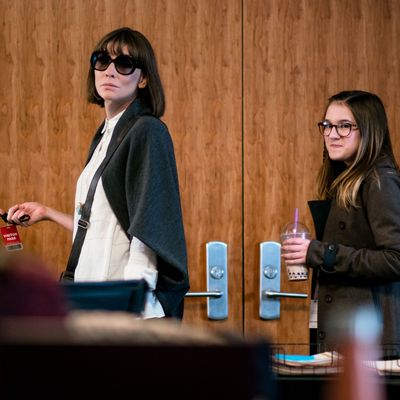
On the basis of his new film, Where’d You Go, Bernadette, Richard Linklater wouldn’t be much good at what TV writers call “breaking” a story — i.e., turning a premise into a blueprint, a series of firm narrative beats. He’s a deceptively crafty director (he fakes naturalism beautifully in movies like Dazed and Confused, Before Sunrise, and Boyhood), but he can’t find a suitable form for Maria Semple’s patchwork best seller about a misanthropic, malcontented ex-architect named Bernadette (played onscreen by Cate Blanchett) who vanishes from her ramshackle Seattle manse after an escalating series of crises and tantrums. Semple (the daughter of the late TV and film writer Lorenzo Semple Jr.) largely writes from the point of view of Bernadette’s teenage daughter, Bee, who’s busy poring over fragments of her missing mother’s life: rambling messages from Bernadette to her “virtual” assistant in India; emails about Bernadette between two disapproving mothers of students at Bee’s progressive school; earnest letters from psychiatrists and FBI agents and mentors from Bernadette’s past. It’s only late in the book that Bee gets a hunch where her mother might have gone, and the revelation is a doozy: Antarctica!
Damn, I’ve spoiled it. No, hold on, I haven’t, because the opening of the movie of Where’d You Go, Bernadette features Bernadette on a kayak amid ice floes while Bee (Emma Nelson) reads a passage from Semple’s book that doesn’t fit those images particularly well. Then the movie jumps back three weeks to show how Bernadette got there, to the edge of the world. Instead of a mystery from the perspective of a bereft daughter, we get a series of dramatic non sequiturs in which Blanchett’s Bernadette takes up the entire foreground. Blanchett’s face holds the screen — she’s a real movie star — and it’s fun to see her swooping around Seattle behind giant sunglasses, running from people in a cartoon panic or staying and dropping zingers. But it’s a showy, external performance, and much of the time you don’t know how you’re supposed to feel about the character. (Bernadette hates everyone, but then almost everyone is hateful, including Bernadette.) She’s not very good company. Why are we even watching her?
In contrast, the book —
Stop. Let me acknowledge that few things are more annoying than people (especially critics) who spend a lot of time complaining about the ways in which a movie is different from a book. Here’s why we’re worth listening to. Sometimes you go to a film and you have no idea what you’re watching. You can’t even tell why it was made. It wasn’t until I read Semple’s book (after I saw the film) that the story began to make a larger sense, as Bee very slowly homed in on the mother she adored but barely knew the essence of. A brilliant groper, Bernadette spent the first part of her life trying to rethink architecturally the idea of home; and she was fumbling her way toward greatness when a billionaire British game-show magnate effectively slapped her down, leaving her traumatized, dysfunctional, homeless. Her husband, Elgin, made millions after a corporate buyout and now spends his days perfecting a supersecret Virtual Assistant project for Microsoft, but wealth has only intensified Bernadette’s isolation. (The fixation on virtual assistants is a metaphor.) For two decades, she has been slouching toward Antarctica to be reborn.
The above can be vaguely discerned in the screenplay by Linklater, Holly Gent, and Vince Palmo, but there are big gaps (was the film heavily edited?) and mistakes of underemphasis. The crushing encounter with the British ass is cut to the bone. The affair between Elgin (Billy Crudup) and a co-worker (Zoe Chao), who also has a child at Bee’s school, was either never shot or shot and dumped, so the character doesn’t really have a punch line; and you can see Crudup once again (he’s also doing it in After the Wedding) staring helplessly from the sidelines at women who feel things so damn intensely. Kristen Wiig is wonderfully funny as Bernadette’s overbearing neighbor and school nemesis, but she and a few of the other actors don’t quite mesh with Linklater’s draggy realism. (Wiig and Blanchett do share the one scene that works, in which the pair have a jittery détente.) With so much that’s out of focus, a great line like the one by Bernadette’s architectural mentor (Laurence Fishburne) suffers from overemphasis: “People like you must create or become a menace to society.” I can hear it in an Italian accent: You must-a create or you’re a gonna die-a.
Emma Nelson has a lovely, sane presence as Bee — she lets you see how a beloved child can at once ground an unstable parent and be a jolly co-conspirator. But she can’t save the scenes in Antarctica from banality. The generally quirky and original composer Graham Reynolds supplies a score that’s alternately too sprightly and too corny-plaintive, and the landscape looks as if it was blue-screened in. Emphatically it was not: Much time and money were reportedly spent so the cast and crew could access our least-accessible continent, but because there’s no sense of mystery or danger or surprise, you don’t feel as if you’re at the edge of the world. You always know where Bernadette is, damn it.


